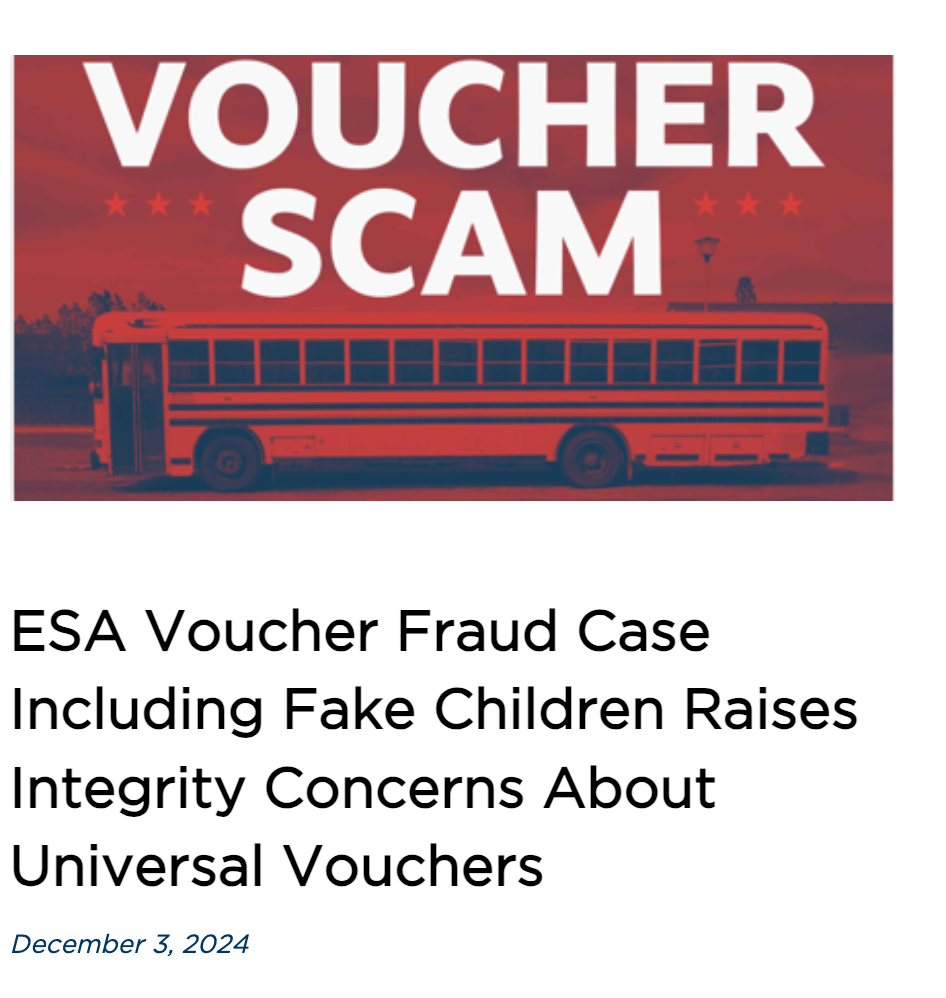
INSIGHT
Voucher programs do not offer the level of accessibility they promise.
School voucher programs are promoted as an effort to provide students from lower-income communities with a better education. But vouchers are often out of reach for the students they're supposedly set up to help. In fact, in states with longstanding voucher programs like Arizona, Missouri, New Hampshire, and Wisconsin, more than 75% of voucher applicants were already attending private schools. This suggests that vouchers are most often used by families that could already afford and had already chosen private education.
Vouchers generally do not cover the full cost of tuition at private schools, leaving families to pay the difference. Even where families can afford private school tuition, voucher programs incentivize private schools to increase tuition and use vouchers as a public subsidy.
And unlike public education, voucher schools often do not provide transportation (especially problematic for rural families), special education services, or free and reduced-price lunches – all additional costs that families must cover.
On Monday, Dec. 2, news broke that an out-of-state couple were indicted for defrauding the Empowerment Scholarship Account (ESA) universal voucher program, by submitting applications for 50 children, 43 of whom do not exist, according to the Arizona Attorney General’s Office.
Arizona does no vetting of new voucher schools. Not even if the school or the online school “provider” has already failed, or was founded yesterday, or is operating out of a strip mall or a living room or a garage, or offers just a half hour of instruction per morning. (If you’re an individual tutor in Arizona, all you need in order to register to start accepting voucher cash is a high school diploma.)
The Support Our Schools Nebraska coalition needed to collect 61,621 signatures to let voters repeal or retain a bill that spends millions of public tax dollars to pay for private schools. Today, the coalition submitted more than 86,000 signatures to the Nebraska Secretary of State to ensure the issue will appear on the November ballot. The group also exceeded the 38-county requirement with 5% of voters signing the petition in more than 60 of the state’s 93 counties.
Arizona, the model for voucher programs across the country, has spent so much money paying private schoolers’ tuition that it’s now facing hundreds of millions in budget cuts to critical state programs and projects.
Voucher schools that use public funds for private education are not subject to the same assessment standards, teaching standards, or reporting standards as public schools; they are not overseen by publicly-elected school boards, required to hold public meetings, or subject to public records laws; they are not necessarily governed by nondiscrimination laws and are not legally required to serve students with disabilities.
Pennsylvania has had a pair of tax credit scholarship school voucher programs (Educational Improvement Tax Credits (EITC) and Opportunity Scholarship Tax Credits (OSTC)) for over twenty years, leaving a $2 billion hole in state revenues. One might think that taxpayers, or those accountable to taxpayers, would want to know how exactly that $2 billion has been used.
The first thing to reflect on is this: Public schools gather everyone. All are invited. There is no test you need to pass, no amount of money or influence or fame you must possess to be allowed in. Do you know how rare that is in the United States today?
PHOENIX — Democratic Gov. Katie Hobbs wants the Republican lawmakers who approved universal vouchers to impose new restrictions on the private and parochial schools that accept them.
Since the early 2000s, many states have introduced significant voucher programs to provide public financing for private school education. These voucher programs are deeply damaging to efforts to offer an excellent public education for all U.S. children—and this is in fact often the intention of those pushing these programs.
Gov. Ron DeSantis in March signed House Bill 1, which expands school voucher eligibility to all, regardless of family income.
The average amount that pays for options like private or homeschooling is $7,800.
As Florida lawmakers expanded eligibility for school vouchers this year, they also gave parents more ways to spend the money.
Theme park passes, 55-inch TVs, and stand-up paddleboards are among the approved items that recipients can buy to use at home. The purchases can be made by parents who home-school their children or send them to private schools, if any voucher money remains after paying tuition and fees.
A recent report from the Georgia Department of Audits and Accounts examines the monetary costs and benefits of the state’s Qualified Education Expense Tax Credit (QEEC). The QEEC is a type of voucher policy that provides a public subsidy for families to pay for private school tuition. Data show the tax credit results in $81 million of forgone state tax revenue per year. The report argues the QEEC provides a net fiscal benefit for Georgia’s state budget based on an estimate that the vouchers cause almost 20,000 students per year to choose private schools instead of public, thus removing the cost of educating those students from state and local budgets. However, because the report relies on unrealistic assumptions, its suggestion that program benefits outweigh costs is tenuous and risks misleading state education leaders. Instead, state leaders should invest educational dollars in policies that have a positive return on in- vestment and therefore help, rather than harm, state and local budgets.
This Illinois Families for Public Schools fact sheet depicts how the Illinois Invest in Kids voucher program is characterized by discriminatory revenue, low academic quality, and compulsory child labor.
Lack of transparency and oversight for how public dollars are being spent is a fundamental flaw of school voucher programs. The Illinois Invest in Kids program is halfway through its fifth school year, and there is still a lot we don’t know about schools and students receiving vouchers. Public access to that data from state agencies is limited.
This op-ed by Kris Nordstrom calls out that many private schools in North Carolina have been awarded more vouchers than they have students. Yet shoddy financial oversight and potential fraud aren’t the only reasons why vouchers are a bad idea for North Carolina. The new data is just the latest evidence that voucher expansion is a mistake. The only question that remains is whether voucher proponents will bother trying to justify this reckless agenda.
This talking points document from the North Carolina Justice Center includes general talking points on the impact of school voucher programs and specific points in response to 2023 voucher legislation.
Mississippi’s PEER* Committee issues a report of the state’s ESA voucher program, which uses public funds to pay private school tuition for children with special needs.
The report Accountability and Private-School Choice, released by the Manhattan Institute in October, 2021, addresses the question of how private school voucher programs should be regulated. That is, if private schools are to receive public funds, what accountability mech- anisms can fairly and reasonably safeguard taxpayer dollars? The report advocates for re- laxing accountability mechanisms that presently constrain some voucher programs, assert- ing that “more and better” private schools will participate in response, benefitting students academically. Such claims, however, are supported by a selective reading and intentional misreading of educational research. Insofar as that is the case, the report merely repeats well-worn ideological positions and neither advances what we know about the challenge of regulating private schools nor offers useful information for policy decisions.
This letter from the Florida Policy Institute and partners calls on the Florida Department of Education (FLDOE) and its scholarship funding organizations (SFOs), Step Up For Students and AAA Scholarship Foundation, to provide more information on students who have applied and been approved for Florida’s Tax Credit (FTC) Scholarships, Family Empowerment Scholarships – Educational Options (FES-EO), and Family Empowerment Scholarships for students with Unique Abilities (FES-UA).
In this policy brief the Public School Forum of North Carolina provides six recommendations for North Carolina’s Opportunity Scholarship school voucher program. The Opportunity Scholarships program in its current or expanded form represents significant investment of taxpayer dollars to support private and parochial schools. Similar to public schools and public charter schools, private schools that receive public dollars must be held accountable to the taxpayers who fund them. Additionally, parents must have access to accurate and reliable information when making school choice decisions, and state leaders must have the data needed to effectively evaluate how private schools receiving public funds are performing and to ensure that all children are receiving a sound basic education.




















